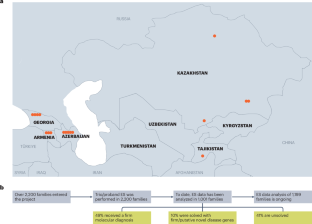阐明中亚和外高加索地区罕见小儿神经系统疾病的基因组基础
Rauan Kaiyrzhanov, Nazira Zharkinbekova, Ulviyya Guliyeva, Manizha Ganieva, Zaruhi Tavadyan, Tamar Gachechiladze, Kamran Salayev, Sughra Guliyeva, Mariam Isayan, Mariam Kekenadze, Biayna Sukhudyan, Ani Gevorgyan, Artsruni Hakobyan, Rima Ibadova, Nazi Tabatadze, Ekaterina Kurua, Teona Shatirishvili, Nigara Yerkhojayeva, Kairgali Koneev, Dauren Zhumakhanov, Askhat Mukushev, Altynshash Jaxybayeva, Alissa Nauryzbayeva, Maksudjon Isrofilov, Saadat Badalova, Naila Zeyniyeva, Ilaha Hajiyeva, Leyla Alakbarov, Aynur Zeynalova, Viorica Chelban, Jana Vandrovcova, Valentina Turchetti, David Murphy, Stephanie Efthymiou, Shahryar Alavi, Rahema Mohammad, Tinatin Tkemaladze, Chingiz Shashkin, Nana Nino Tatishvili, Maia Beridze, Samson G. Khachatryan, Gia Melikishvili, John Hardy, Reza Maroofian, Henry Houlden
求助PDF
{"title":"阐明中亚和外高加索地区罕见小儿神经系统疾病的基因组基础","authors":"Rauan Kaiyrzhanov, Nazira Zharkinbekova, Ulviyya Guliyeva, Manizha Ganieva, Zaruhi Tavadyan, Tamar Gachechiladze, Kamran Salayev, Sughra Guliyeva, Mariam Isayan, Mariam Kekenadze, Biayna Sukhudyan, Ani Gevorgyan, Artsruni Hakobyan, Rima Ibadova, Nazi Tabatadze, Ekaterina Kurua, Teona Shatirishvili, Nigara Yerkhojayeva, Kairgali Koneev, Dauren Zhumakhanov, Askhat Mukushev, Altynshash Jaxybayeva, Alissa Nauryzbayeva, Maksudjon Isrofilov, Saadat Badalova, Naila Zeyniyeva, Ilaha Hajiyeva, Leyla Alakbarov, Aynur Zeynalova, Viorica Chelban, Jana Vandrovcova, Valentina Turchetti, David Murphy, Stephanie Efthymiou, Shahryar Alavi, Rahema Mohammad, Tinatin Tkemaladze, Chingiz Shashkin, Nana Nino Tatishvili, Maia Beridze, Samson G. Khachatryan, Gia Melikishvili, John Hardy, Reza Maroofian, Henry Houlden","doi":"10.1038/s41588-024-02016-x","DOIUrl":null,"url":null,"abstract":"","PeriodicalId":18985,"journal":{"name":"Nature genetics","volume":"56 12","pages":"2582-2584"},"PeriodicalIF":31.7000,"publicationDate":"2024-11-22","publicationTypes":"Journal Article","fieldsOfStudy":null,"isOpenAccess":false,"openAccessPdf":"","citationCount":"0","resultStr":"{\"title\":\"Elucidating the genomic basis of rare pediatric neurological diseases in Central Asia and Transcaucasia\",\"authors\":\"Rauan Kaiyrzhanov, Nazira Zharkinbekova, Ulviyya Guliyeva, Manizha Ganieva, Zaruhi Tavadyan, Tamar Gachechiladze, Kamran Salayev, Sughra Guliyeva, Mariam Isayan, Mariam Kekenadze, Biayna Sukhudyan, Ani Gevorgyan, Artsruni Hakobyan, Rima Ibadova, Nazi Tabatadze, Ekaterina Kurua, Teona Shatirishvili, Nigara Yerkhojayeva, Kairgali Koneev, Dauren Zhumakhanov, Askhat Mukushev, Altynshash Jaxybayeva, Alissa Nauryzbayeva, Maksudjon Isrofilov, Saadat Badalova, Naila Zeyniyeva, Ilaha Hajiyeva, Leyla Alakbarov, Aynur Zeynalova, Viorica Chelban, Jana Vandrovcova, Valentina Turchetti, David Murphy, Stephanie Efthymiou, Shahryar Alavi, Rahema Mohammad, Tinatin Tkemaladze, Chingiz Shashkin, Nana Nino Tatishvili, Maia Beridze, Samson G. Khachatryan, Gia Melikishvili, John Hardy, Reza Maroofian, Henry Houlden\",\"doi\":\"10.1038/s41588-024-02016-x\",\"DOIUrl\":null,\"url\":null,\"abstract\":\"\",\"PeriodicalId\":18985,\"journal\":{\"name\":\"Nature genetics\",\"volume\":\"56 12\",\"pages\":\"2582-2584\"},\"PeriodicalIF\":31.7000,\"publicationDate\":\"2024-11-22\",\"publicationTypes\":\"Journal Article\",\"fieldsOfStudy\":null,\"isOpenAccess\":false,\"openAccessPdf\":\"\",\"citationCount\":\"0\",\"resultStr\":null,\"platform\":\"Semanticscholar\",\"paperid\":null,\"PeriodicalName\":\"Nature genetics\",\"FirstCategoryId\":\"99\",\"ListUrlMain\":\"https://www.nature.com/articles/s41588-024-02016-x\",\"RegionNum\":1,\"RegionCategory\":\"生物学\",\"ArticlePicture\":[],\"TitleCN\":null,\"AbstractTextCN\":null,\"PMCID\":null,\"EPubDate\":\"\",\"PubModel\":\"\",\"JCR\":\"Q1\",\"JCRName\":\"GENETICS & HEREDITY\",\"Score\":null,\"Total\":0}","platform":"Semanticscholar","paperid":null,"PeriodicalName":"Nature genetics","FirstCategoryId":"99","ListUrlMain":"https://www.nature.com/articles/s41588-024-02016-x","RegionNum":1,"RegionCategory":"生物学","ArticlePicture":[],"TitleCN":null,"AbstractTextCN":null,"PMCID":null,"EPubDate":"","PubModel":"","JCR":"Q1","JCRName":"GENETICS & HEREDITY","Score":null,"Total":0}
引用次数: 0
引用
批量引用




